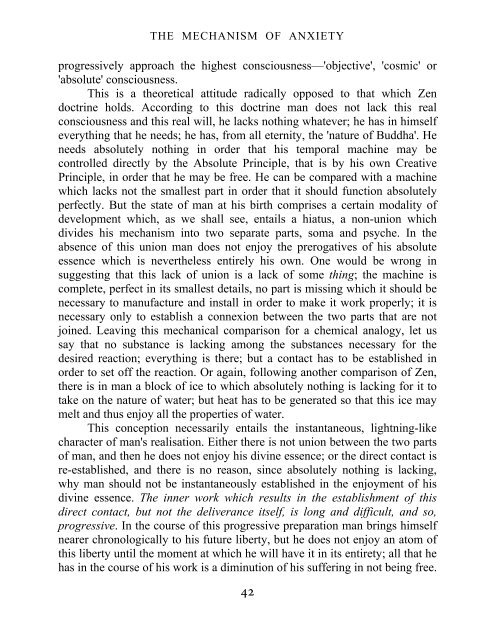The Supreme Doctrine - neo-alchemist
The Supreme Doctrine - neo-alchemist
The Supreme Doctrine - neo-alchemist
Create successful ePaper yourself
Turn your PDF publications into a flip-book with our unique Google optimized e-Paper software.
THE MECHANISM OF ANXIETY<br />
progressively approach the highest consciousness—'objective', 'cosmic' or<br />
'absolute' consciousness.<br />
This is a theoretical attitude radically opposed to that which Zen<br />
doctrine holds. According to this doctrine man does not lack this real<br />
consciousness and this real will, he lacks nothing whatever; he has in himself<br />
everything that he needs; he has, from all eternity, the 'nature of Buddha'. He<br />
needs absolutely nothing in order that his temporal machine may be<br />
controlled directly by the Absolute Principle, that is by his own Creative<br />
Principle, in order that he may be free. He can be compared with a machine<br />
which lacks not the smallest part in order that it should function absolutely<br />
perfectly. But the state of man at his birth comprises a certain modality of<br />
development which, as we shall see, entails a hiatus, a non-union which<br />
divides his mechanism into two separate parts, soma and psyche. In the<br />
absence of this union man does not enjoy the prerogatives of his absolute<br />
essence which is nevertheless entirely his own. One would be wrong in<br />
suggesting that this lack of union is a lack of some thing; the machine is<br />
complete, perfect in its smallest details, no part is missing which it should be<br />
necessary to manufacture and install in order to make it work properly; it is<br />
necessary only to establish a connexion between the two parts that are not<br />
joined. Leaving this mechanical comparison for a chemical analogy, let us<br />
say that no substance is lacking among the substances necessary for the<br />
desired reaction; everything is there; but a contact has to be established in<br />
order to set off the reaction. Or again, following another comparison of Zen,<br />
there is in man a block of ice to which absolutely nothing is lacking for it to<br />
take on the nature of water; but heat has to be generated so that this ice may<br />
melt and thus enjoy all the properties of water.<br />
This conception necessarily entails the instanta<strong>neo</strong>us, lightning-like<br />
character of man's realisation. Either there is not union between the two parts<br />
of man, and then he does not enjoy his divine essence; or the direct contact is<br />
re-established, and there is no reason, since absolutely nothing is lacking,<br />
why man should not be instanta<strong>neo</strong>usly established in the enjoyment of his<br />
divine essence. <strong>The</strong> inner work which results in the establishment of this<br />
direct contact, but not the deliverance itself, is long and difficult, and so,<br />
progressive. In the course of this progressive preparation man brings himself<br />
nearer chronologically to his future liberty, but he does not enjoy an atom of<br />
this liberty until the moment at which he will have it in its entirety; all that he<br />
has in the course of his work is a diminution of his suffering in not being free.<br />
42




